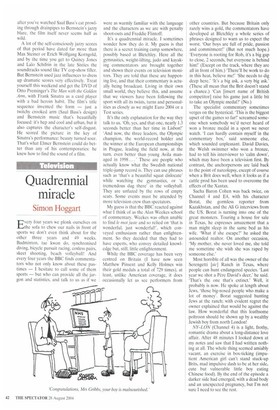Quadrennial miracle
Simon Hoggart
EIvery four years we plonk ourselves on ,
I ' the sofa to chew our nails in front of sports we don't even think about for the other three years and 49 weeks. Badminton, tae kwon do, synchronised diving, bicycle pursuit racing, coxless pairs, skeet shooting, beach volleyball! And every four years the BBC finds commentators who not only know about these pastimes — I hesitate to call some of them sports — but who can provide all the jargon and statistics, and talk to us as if we
were as warmly familiar with the language and the characters as we are with penalty shoot-outs and Freddie Flintoff.
It's a quadrennial miracle. I sometimes wonder how they do it. My guess is that there is a secret training camp somewhere, possibly based at Bletchley. Here all the gymnastics, weight-lifting, judo and kayaking commentators are brought together and shown their events on television monitors. They are told that these are happening live, and that their commentary is actually being broadcast. Living in their own small world, they believe this, and assume that we viewers have been following the sport with all its twists, turns and personalities as closely as we might Euro 2004 or a Test series.
It's the only explanation for the way they talk to us. 'Oh, yes, and that one, nearly 1.3 seconds better than her time in Lisbon!' 'And now, the three leaders, the Olympic champion, the world-record holder and the winner at the European championships in Prague, leading the field now, at the turn, even better than young Avila man aged in 1998 ' These are people who actually know what the Swedish national triple-jump record is. They can use phrases such as 'that's a beautiful squat dislocate' while watching the gymnastics, or 'a tremendous dug there' in the volleyball. They are unfazed by the rows of empty seats. Some events must be attended by more television crew than spectators.
My guess is that the BBC reacted against what I think of as the Alan Weekes school of commentary. Weekes was often unable to find le mot juste and so relied on 'that is wonderful, just wonderful!', which conveyed enthusiasm rather than enlightenment. So they decided that they had to have experts, who convey detailed knowledge but, still, little enlightenment.
While the BBC coverage has been very centred on Britain (I have now seen Matthew Pinsent and Kelly Holmes win their gold medals a total of 729 times), at least, unlike American coverage, it does occasionally let us see performers from other countries. But because Britain only rarely wins a gold, the commentators have developed at Bletehley a whole series of phrases designed to warn us to expect the worst. 'Our boys are full of pride, passion and commitment!' (But not much hope.) 'Everyone is rooting for Rob, it's a big gap to close, 2 seconds, but everyone is behind him!' (Except on the track, where they are all in front of him.) 'There'll be work to do in this heat, believe me!' She needs to dig deep here.' It's a big ask, a very big ask.' (These all mean that the Brit doesn't stand a chance.) 'Can [insert name of British competitor] raise his game just a little bit to take an Olympic medal?' (No.) The specialist commentary sometimes verges on the hysterical. 'This is the biggest upset of the games so far!' screamed someone when somebody we'd never heard of won a bronze medal in a sport we never watch. 'I can hardly contain myself in the commentary box,' said someone else, which sounded unpleasant. David Davies, the Welsh swimmer who won a bronze, had to tell his interviewer to 'calm down', which may have been a television first. By contrast, the anchorpersons are laid back to the point of narcolepsy, except of course when a Brit does well, when it looks as if a cattle prod has been used to overcome the effects of the Xantax.
Sacha Baron Cohen was back twice, on Channel 4 and E4, with his character Borat, the gormless reporter from Kazakhstan, and the Ali G interviews from the US. Borat is turning into one of the great monsters. Touring a house for sale in Texas, he expresses amazement that a man might sleep in the same bed as his wife. 'What if she escape?' he asked the astounded realtor. On another occasion, 'My mother, she never loved me, she told me sometime she wish she was raped by someone else.'
Most horrible of all was the owner of the Serengetti [sic] Ranch in Texas, where people can hunt endangered species. 'Last year we shot a Pere David's deer,' he said. 'That's the one that's extinct.' Well, it probably is now. He spoke at length about Jews, 'those big-nosed people who make a lot of money'. Borat suggested hunting Jews at the ranch; with evident regret the owner explained that would be against the law. How wonderful that this loathsome poltroon should be shown up by a wealthy Jewish boy from north London!
NY–LON (Channel 4) is a light, frothy, romantic drama about a long-distance love affair. After 48 minutes I looked down at my notes and saw that I had written nothing at all. The whole thing seemed amiably vacant, an exercise in box-ticking (impatient American girl can't stand stuck-up Brits, mad impulsive dash to be at her side, cute but vulnerable little boy eating Chinese food). By the end of the episode a darker side had emerged, with a dead body and an unexpected pregnancy, but I'm not sure I need to see the rest.


























































 Previous page
Previous page